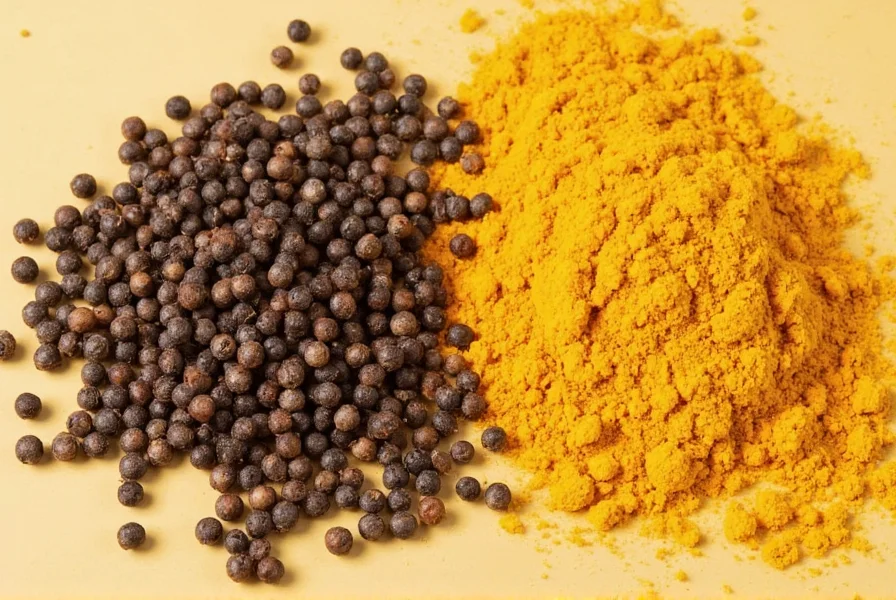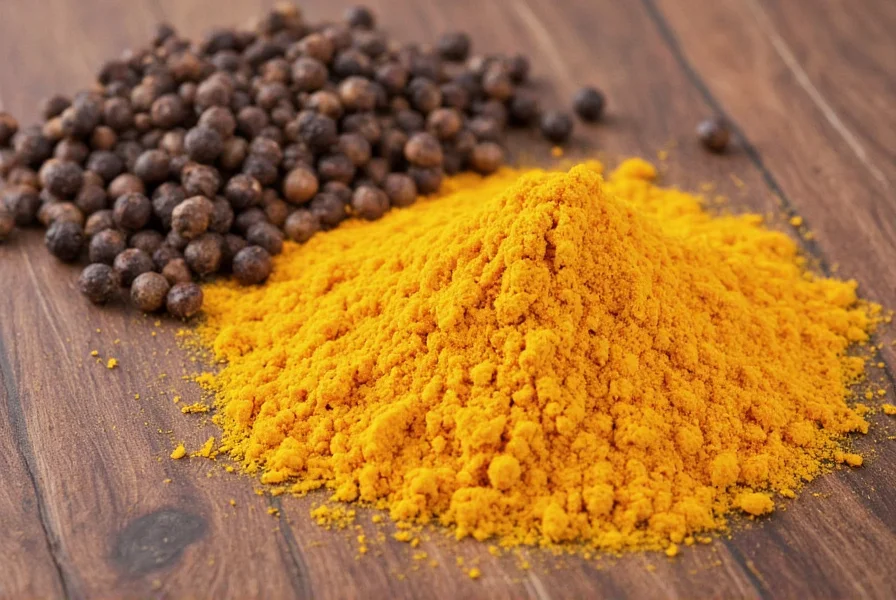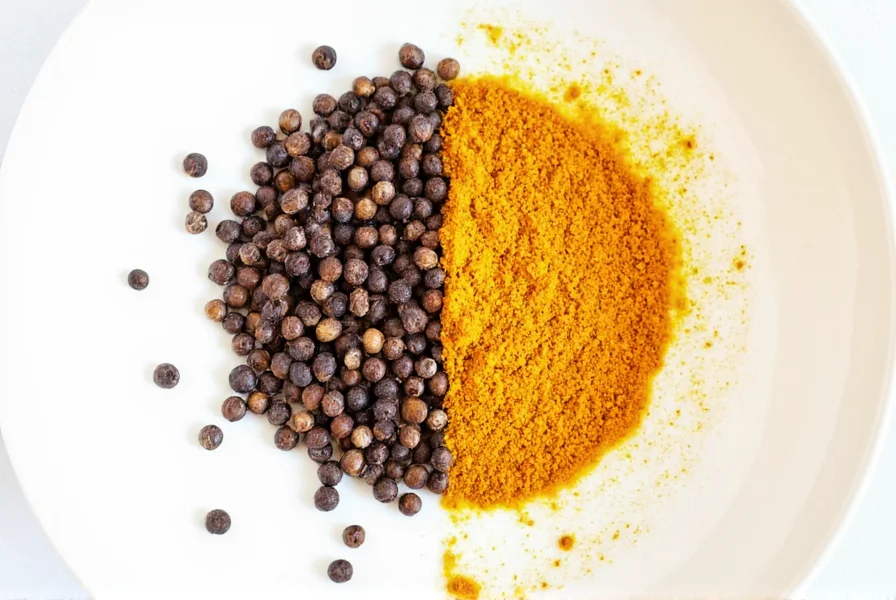The Powerful Synergy Between Black Pepper and Turmeric
When discussing natural health boosters, few combinations rival the powerful synergy between black pepper and turmeric. Turmeric contains curcumin, a potent compound with well-documented anti-inflammatory and antioxidant properties. However, curcumin has notoriously poor bioavailability when consumed alone. This is where black pepper's active component, piperine, becomes crucial. Research shows that adding just 20mg of piperine to curcumin can increase its bioavailability by an astonishing 2,000%, transforming how your body absorbs and utilizes these beneficial compounds.
The Science Behind the Enhanced Absorption
Curcumin faces significant challenges in the human body. When consumed without enhancement, it's rapidly metabolized and eliminated, with studies showing less than 1% bioavailability. The liver breaks it down quickly through a process called glucuronidation, while the intestinal wall limits its absorption.
Piperine, the bioactive alkaloid in black pepper, addresses these limitations through multiple mechanisms:
- Inhibits intestinal and hepatic glucuronidation, slowing curcumin metabolism
- Increases intestinal absorption of nutrients
- Enhances permeability of cell membranes
- Slows the breakdown of curcumin in the digestive tract
A landmark 1998 study published in Planta Medica demonstrated this dramatic effect, showing that when curcumin was combined with piperine, blood levels of curcumin increased by 2,000% compared to curcumin alone. This research established the scientific foundation for why these spices are almost always recommended together for health benefits.
| Curcumin Formulation | Bioavailability Increase | Research Source |
|---|---|---|
| Curcumin alone | Baseline (1x) | Shoba et al., 1998 |
| Curcumin with piperine | 2,000% increase | Shoba et al., 1998 |
| Curcumin with phospholipids | 29x increase | Antony et al., 2008 |
| Nanoparticle curcumin | Up to 185x increase | Wang et al., 2016 |
Health Benefits of the Black Pepper and Turmeric Combination
The enhanced bioavailability from combining black pepper and turmeric translates to significantly improved health outcomes. Research indicates this powerful pairing offers:
Superior Anti-Inflammatory Effects
Chronic inflammation underlies many modern diseases. The enhanced curcumin absorption from adding black pepper allows for more effective reduction of inflammatory markers like NF-kB and cytokines. Studies show this combination may be particularly beneficial for arthritis management, with participants reporting reduced joint pain and improved mobility.
Enhanced Antioxidant Protection
Curcumin's antioxidant capacity increases dramatically when properly absorbed. This helps neutralize free radicals while boosting the body's own antioxidant enzymes. The black pepper and turmeric combination provides more comprehensive cellular protection against oxidative stress.
Improved Brain Health
Curcumin crosses the blood-brain barrier more effectively when combined with piperine, potentially increasing brain-derived neurotrophic factor (BDNF). This may support cognitive function and offer protection against neurodegenerative conditions.
Better Metabolic Health
Research suggests the enhanced curcumin from this combination may improve insulin sensitivity and support healthy blood sugar levels, making it valuable for metabolic health management.
Practical Applications: How to Use Black Pepper and Turmeric Together
Understanding the science is valuable, but implementing it effectively matters most. Here's how to maximize the benefits of this powerful spice pairing:
Optimal Ratios and Amounts
For therapeutic benefits, research suggests:
- 500-2,000mg of curcumin daily (equivalent to 1-3 teaspoons of turmeric)
- 5-20mg of piperine (about 1/20 to 1/8 teaspoon of black pepper)
In culinary applications, a simple guideline is to add approximately 1/4 teaspoon of black pepper for every teaspoon of turmeric used. This ratio provides sufficient piperine to enhance absorption without overwhelming the flavor profile.
Preparation Methods That Maximize Benefits
Certain preparation techniques significantly boost the effectiveness of the black pepper and turmeric combination:
- Fat-soluble delivery: Combine with healthy fats (coconut oil, olive oil, avocado) as curcumin is fat-soluble
- Heat activation: Gentle heating (as in cooking) can increase curcumin solubility
- Acidic environment: Adding lemon juice or other acids may further enhance stability
A simple golden milk recipe incorporating these principles: heat 1 cup of milk (dairy or plant-based) with 1 teaspoon turmeric, 1/4 teaspoon black pepper, 1/2 teaspoon coconut oil, and a pinch of cinnamon until warm but not boiling.
Important Considerations and Precautions
While the black pepper and turmeric combination offers significant benefits, certain considerations are important:
Potential Medication Interactions
Piperine can affect how the body metabolizes certain medications by inhibiting specific enzymes. Those taking prescription medications, particularly:
- Blood thinners
- Diabetes medications
- Antidepressants
- Chemotherapy drugs
should consult with a healthcare provider before consuming therapeutic amounts of this combination.
Digestive Sensitivity
Some individuals may experience mild digestive discomfort when first introducing this combination. Starting with smaller amounts and gradually increasing can help the body adjust.
Scientific Evidence Beyond Bioavailability
Research continues to uncover additional synergistic effects between black pepper and turmeric beyond just absorption enhancement:
- A 2020 study in Phytotherapy Research found the combination demonstrated superior anti-cancer properties compared to curcumin alone
- Research in Journal of Medicinal Food showed enhanced neuroprotective effects in animal models
- Multiple studies indicate the pairing may improve the stability of curcumin in the digestive tract
While most research focuses on the bioavailability enhancement, emerging evidence suggests piperine may contribute additional therapeutic properties that complement curcumin's effects.
Practical Ways to Incorporate This Powerful Pairing
You don't need complex supplements to benefit from black pepper and turmeric. Simple daily integration methods include:
- Adding both to scrambled eggs or omelets
- Creating a spice blend for roasted vegetables
- Mixing into salad dressings with olive oil
- Adding to soups and stews during cooking
- Preparing a morning tonic with warm water, lemon, turmeric, and black pepper

For those seeking more concentrated benefits, look for supplements specifically formulated with both curcumin and piperine, typically labeled as "curcumin with bioperine" (Bioperine being a standardized piperine extract).
Conclusion: Maximizing Nature's Synergy
The relationship between black pepper and turmeric represents one of nature's most scientifically validated synergistic pairings. By understanding how piperine dramatically enhances curcumin bioavailability, you can make informed choices about incorporating this powerful combination into your wellness routine. Whether through culinary applications or targeted supplementation, this dynamic duo offers a natural approach to supporting inflammation management, antioxidant protection, and overall health when used thoughtfully and consistently.
Frequently Asked Questions
How much black pepper should I add to turmeric for maximum benefits?
Research suggests adding approximately 1/20 to 1/8 teaspoon of black pepper (providing 5-20mg of piperine) for every teaspoon of turmeric. In culinary applications, a practical ratio is about 1/4 teaspoon of black pepper per teaspoon of turmeric. This small amount is sufficient to significantly enhance curcumin absorption without overpowering the flavor.
Can I get the same benefits from white pepper instead of black pepper?
No, white pepper does not provide the same benefits as black pepper for enhancing turmeric absorption. The key compound piperine is significantly reduced in white pepper during processing. Black pepper contains approximately 4-5% piperine, while white pepper contains much lower concentrations. For maximum curcumin bioavailability, black pepper is essential.
How long does it take to notice benefits from combining black pepper and turmeric?
Noticeable benefits typically emerge after consistent use for 4-8 weeks. Some people report reduced joint discomfort within 2-3 weeks, while more systemic benefits like improved metabolic markers may take 2-3 months of regular consumption. The timeframe varies based on individual factors including overall health status, dosage, and consistency of use.
Is it safe to consume black pepper and turmeric daily?
For most people, consuming culinary amounts of black pepper and turmeric daily is considered safe. Therapeutic doses (1-3 grams of turmeric with appropriate black pepper) are generally well-tolerated for extended periods. However, those with gallbladder issues, bleeding disorders, or who are pregnant should consult a healthcare provider before regular therapeutic use.
Does cooking affect the black pepper and turmeric synergy?
Moderate cooking actually enhances the synergy between black pepper and turmeric. Gentle heating increases curcumin's solubility, while the addition of healthy fats during cooking further improves absorption. However, prolonged high-heat cooking can degrade some beneficial compounds, so adding turmeric toward the end of cooking is recommended for maximum benefit.












 浙公网安备
33010002000092号
浙公网安备
33010002000092号 浙B2-20120091-4
浙B2-20120091-4